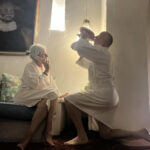Eye’ll Be Seeing You
Positive write-up in Rave Magazine as a precursor to the Brisbane (Queensland Australia) gigs on the coming weekend.
Author: Gavin Sawford.
Date: July 31 – August 6, 2001 Issue.
Mark Seymour plays the Hard Rock Cafe this Friday and the Healer on Saturday.
In late 1996, with his band taking a sabbatical after yet another intensive national tour, Mark Seymour returned to the recording studio with his Hunters and Collectors cohort Barry Palmer. The result was Seymour’s debut solo album, King Without A Clue, released the following year.
Four years later, and two years after the Hunters officially called it a day, Seymour recorded a followup, One Eyed Man, released earlier this year to much critical acclaim. And yet Seymour is the first to admit that, without Hunters and Collectors to fall back on, the recording of One Eyed Man was a much more fraught process than that of its predecessor.
“We realised that the fact that the band had fully retired and it as a much more serious undertaking,” he recalls. “The band had ended so I couldn’t rely on the idea that I was still in Hunters and Collectors to escape whatever reception a solo record may or may not receive. I had to take it pretty seriously in terms of how my voice was travelling.”
“So the songs were only recorded in bunches of two or three at a time, and I would just scrap material if I didn’t think that it fitted in to the way they’d come up in recording. And so a lot of songs got written that didn’t appear on the record. I used my voice as the basic barometer of how the whole thing was emerging. I’d listen to the way my voice sounded on tape, and the songs that survived were the ones that were the most melodic.”
Much of One Eyed Man is also intimately bound up with the last years of Hunters and Collectors; the title track being written by Seymour after a nasty encounter early one morning in Kings Cross that left him questioning some long held beliefs. He presented the song to the rest of the band, who promptly rejected it. “Look, with all fairness to the guys that happened to be sitting around me at the time I played the opening chords of that song, I just don’t think that they…” Seymour trails off, before reconsidering.
“I think my relationship with some of the others had deteriorated to such a point that they could make fairly off-the-cuff commends about anybody’s ideas really. I mean one person could throw up an idea, and if there was one other person in the room who didn’t like it, it wouldn’t see the light of day. I mean the band’s greatest strength was the amount of creative resources we had, but they all had to be working. For a song to actually make it through to the next stage, everybody had to feel that they actually could contribute something, and if they didn’t, then there’d just be a basic lack of interest from a particular group in the band. And because it was such a large group, that would have a devastating effect on us all, it just would never see the light of day.”
“I just think with that particular song, because I’ve been through quite a pretty important personal experience to come up with it, I just felt quite strongly about it. And when one person said “Uhhh, it sounds a bit melancholy to me”, I just thought well, that’s the way it’s meant to sound, and I didn’t think that was sufficient reason not to record it. So instead of trying to petition all the others, I just thought I’d keep it. And that was quite a critical step for me.
“I just thought there was actually something fairly fundamentally important about that little episode with the band. I thought, well if it’s just going to get knocked on the head for such a peripheral reason, why not assess it in terms of how good a song it is? And whether or not is stands up in it’s own right. That was a really weird comment to make, so I just thought, well, I’ll keep it for myself.”
The band’s loss is out gain, and the songs on One Eyed Man are easily as good, and in many cases better – than Seymour’s finest work with his old band. Take for instance Strange Little Town, a sparse but passionate song that resonates as strongly as The Holy Grail.
“That just might have been because (of) my guitar on the record,” Seymour says. “There’s something about guitar; if I’m singing with electric guitar, my voice tended to shift mood. I think that might by why my vocal sounds quite like that. I actually never imagined that song to be as full as it is. The original version of that song was quite mellow and sparse, and I do it acoustically a lot of the time, it’s one of the ones I quite like to play on my own.”
N/A.





